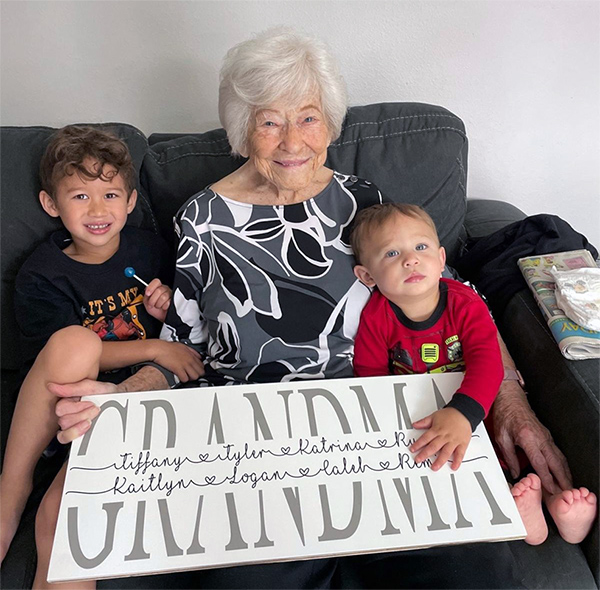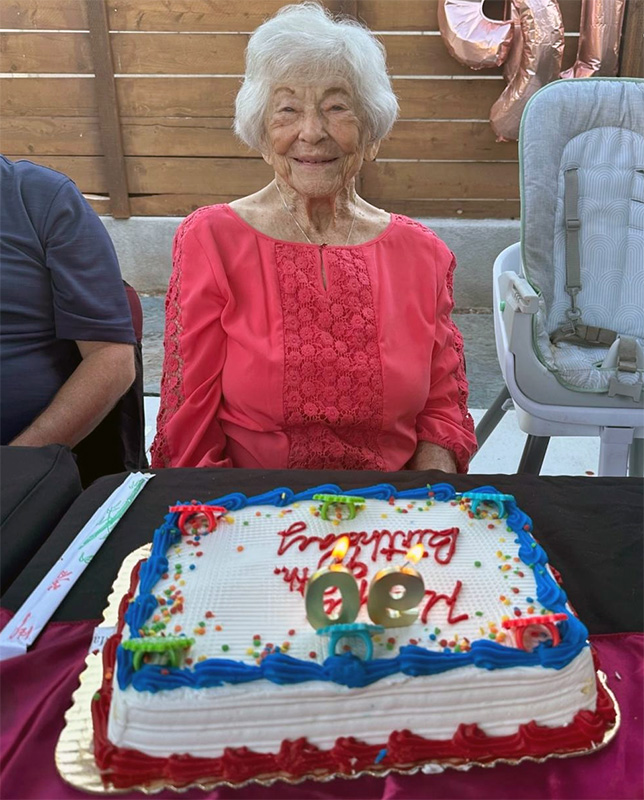
Betty Swartzentruber, now 90 years young, received lifesaving care from the cardiac specialists and surgeons at MemorialCare Heart & Vascular Institute.
Betty learned to live with atrial fibrillation (AFib) for the majority of her senior life and managed her AFib symptoms with various medications and lifestyle modifications. However, earlier this year, Betty experienced complications from an AFib episode different any others, sending her to the emergency room not once, but twice.
Betty was first seen at a large hospital in Los Angeles County to help alleviate her Afib symptoms. She was sent home with medication and told her to monitor her symptoms in case anything new occurred.
Ten days later, Betty went to MemorialCare Saddleback Medical Center for additional assistance, and the MemorialCare Heart & Vascular Institute ordered a CAT scan to see if there were any other options to solve her AFib. The CAT scan found something much, much scarier instead, an ascending aortic dissection, which could be a lethal diagnosis if not treated.
Because of her age and other health issues, the care team at Saddleback advised her and her family to avoid open-heart surgery since her body would most likely not be able to handle the surgery and recovery afterward. The care team talked through her options and both parties agreed that hospice care was the best choice. Her family began preparations for her hospice care and began to say their goodbyes.
“It was a very hard time for our entire family,” says Katrina Navarro, Betty’s granddaughter. “We flew out family from out-of-state to say goodbye to her before she passed – we didn’t know which moment would be her last.”
As her family prepared her for hospice, Dr. Jeffrey Altschuler consulted on her case and was familiar with an FDA approved study to treat patients with her pathology – an aortic endograft. If Betty qualified for this study and approved for the treatment, it could save her life.
“An aortic endograft is a wire tube covered with fabric mesh which essentially acts as scaffolding to support and cover the inside of the aorta,” says Dr. Rodney White, medical director, vascular surgery, MemorialCare Heart & Vascular Institute, Long Beach Medical Center. “This type of procedure is minimally invasive and can be done with minimal incisions, helping reduce hospitalization and recovery times, and it also helps restore healthy blood flow. In Betty’s case, it was the difference between life and death.”
With the support of her family and her tenacious spirit, she agreed to have the procedure done. Betty was quickly transferred to Long Beach Medical Center for evaluation and treatment by the cardiac team.
Dr. Altschuler and Dr. White, with help from Dr. Ali Khoynezhad, director, aortic and arrythmia surgery, MemorialCare Heart & Vascular Institute, Long Beach Medical Center, successfully performed the aortic endograft procedure and resolved Betty’s aortic dissection. After being discharged from the hospital, she was treated at Long Beach Medical Center’s Cardiac Rehabilitation Center for three hours a day as part of its thorough 10-day program. After her rehabilitation, she went home and made a full recovery.
Shortly after her rehabilitation at Long Beach Medical Center, Betty visited her cardiologist at Saddleback Medical Center to solve her Afib once and for all. Her cardiologist recommended her to have an electric cardioversion – a procedure where a cardiologist sends controlled, electric shocks through the chest wall to reset the heart’s rhythm. Dr. Paul Drury, medical director, electrophysiology, MemorialCare Heart & Vascular Institute, Saddleback Medical Center, performed the cardioversion, which stopped Betty’s AFib for good.
After being fully absolved of all her heart conditions, Betty quickly returned to normal activity, renewed her driver’s license, and now lives independently in an active retirement community in Southern California playing cards with her friends. She also traveled to Ireland for 10 days with her son and witnessed the birth of another great grandchild this past month. Shortly after treatment, Betty was able to celebrate her 90th birthday with family and friends by her side.
“I am so thankful for the specialists at MemorialCare Heart & Vascular Institute,” said Swartzentruber. “After being told I had little time left, I am so grateful to be alive.”
MemorialCare Heart & Vascular Institute specializes in advanced, minimally invasive heart & vascular procedures. Its renowned cardiac specialists utilize innovative techniques, so patients benefit from fewer complications, less scarring, greater comfort, and faster recoveries. Distinguished as a leading heart and vascular institute, the MemorialCare Heart & Vascular Institute offers personalized prevention programs, world-renowned physicians, leading diagnostic screenings, advanced treatment, rehabilitation, and leading-edge research. The cardiac team and medical staff are passionate about providing the highest quality of patient and family-centered care.
“MemorialCare Heart & Vascular Institute delivers the highest level of cardiac care,” said Dr. White. “It makes us so proud to see our cardiac teams at both hospitals working together to bring lifesaving results to a patient. Betty’s recovery is a perfect example of taking control of your health, asking for second opinions, and seeking treatment from qualified medical professionals.”
